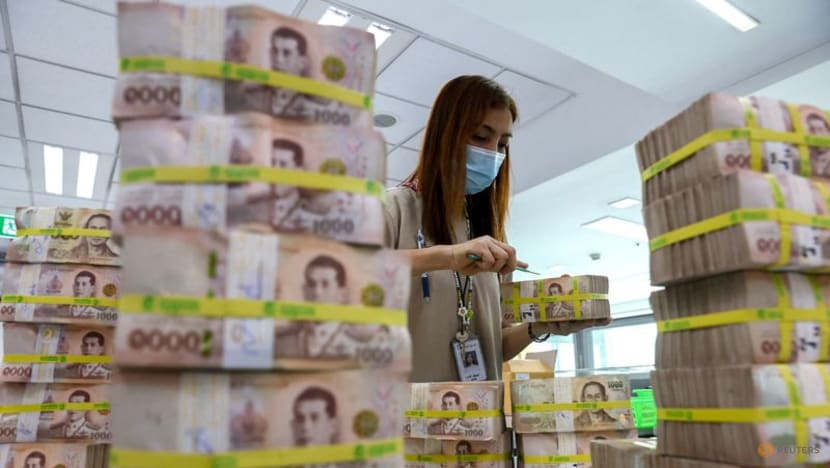Commentary: A strong baht is putting Thailand in a tight spot
The baht’s rally threatens a new setback for Thailand’s languishing economy, says Daniel Moss for Bloomberg Opinion.

A bank employee gathers Thai baht notes at a Kasikornbank in Bangkok, Thailand, Jan 26, 2023. REUTERS/Athit Perawongmetha/File Photo
SINGAPORE: Is Thailand on the cusp of yet another crisis? If you listened to top business figures, you might think a calamity is in the making – from the baht's strength. The currency’s rally threatens a new setback for the languishing economy. And authorities have few easy choices to deal with it.
The baht, whose artificially high valuation was a trigger for the Asian financial crisis of the 1990s, has done very well this year. It is one of the region’s best performers against the US dollar, gaining around 6 per cent and reaching the highest level since 2021.
The challenge, which has officials foreshadowing a response, is of a different order to what the central bank called “the Tom Yum Kung Crisis”, after the famous spicy soup.
In July 1997, Bangkok allowed the currency, which floats freely now, to fall precipitously, and turned to the International Monetary Fund for a bailout. A generation of policymakers learned – or ought to have – a key lesson. In a daily market of US$7.5 trillion, no government can really hold out against traders for long.
The same general principle applies on the way up. Authorities can turn a few knobs, tweak some incentives to offload some baht here or there. It’s mostly just tinkering.
OFFICIALS SHOULD RECOGNISE THEIR LIMITS
Urging the state to ride to the rescue can only achieve so much. But it does get the attention of a new administration that might be eager to notch some early wins, however superficial.
A baht that's too robust “destroys the country's competitiveness”, declared the Thai Chamber of Commerce chief. Businesses tend to prefer exchange rates that are weaker rather than strong. It's tricky to identify a correct level for a currency that is, ultimately, subject to market forces.
Officials aren't entirely powerless, but they should recognise their limits. The Bank of Thailand vowed to curb fluctuations. Interest rate cuts, already on the cards after a fan of easy policy was named to lead the authority, may come faster and might be deeper. Thailand's battle with deflation warrants lower borrowing costs. Consumer prices have been declining since April, and officials have been far too conservative.
The baht has a close link to gold, which has climbed about 45 per cent this year to a record. Thailand is a minnow in production, but is one of Asia's largest markets for the precious metal. When Thailand’s residents trade bullion and proceeds are converted to local currency from dollars, the baht gets a boost. Gold plays a major role in religious ceremonies, and is often given to newlyweds and newborns.
The relationship is so tight that it can make the local currency seem gravity-defying, even when there’s little in the outlook to encourage baht bulls. Tourism, long a bright spot when other sectors faltered, is enduring some tough times. Manufacturing tumbled in August. And tariffs imposed by the White House will hit exports.
Bank of Thailand Deputy Governor Piti Disyatat summed it up well in an interview in August. “Our economy is growing below potential right now,” he told Bloomberg TV. “Fundamentals would dictate a slightly weaker currency than you would think at this point.”
Then there’s the Southeast Asian kingdom’s fraught politics. Anutin Charnvirakul was sworn in last week as the third prime minister since inconclusive elections in 2023. Many of his predecessors haven’t lasted very long, ousted by courts or the army.
Anutin himself only secured support in parliament by agreeing to call a fresh vote within months. He’s under pressure to stimulate the economy, which might, ironically, strengthen the baht.
A TIGHT SPOT
There isn't an enormous amount Thailand can do. Intervention can take the edge off baht fluctuations, but can't prevent a sustained rally. Dollar purchases to constrain the baht here and there are fine, but large-scale operations risk tut-tutting from the US. Capital controls are blunt, a last resort and would be temporary.
So Thailand is in a tight spot. Some frustration is understandable. No leader likes to think they are entirely at the mercy of markets – and without a powerful benefactor.
What might arouse resentment is the way the US Treasury is offering to backstop Argentine President Javier Milei with a US$20 billion lifeline. Thailand, a staunch US ally, was denied direct American help in 1997. The Clinton Administration backed the IMF package, but balked at a bilateral loan alongside it.
The Treasury team fretted about angering Congress. Robert Rubin, who led the department then, later expressed regret. “I probably did give too little weight to the symbolic benefits – economic and geopolitical,” he wrote in his memoir.
Today’s Thai leaders have few options other than to grin and bear it. That is their burden, and opportunity – provided they don’t mess it up.














